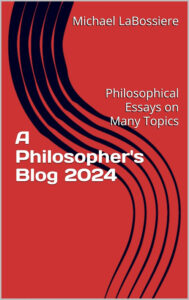 This book contains essays from the 2024 postings of A Philosopher’s Blog. Subjects range from the ethics of trans athletes competing in sports to the metaphysics of love across the possible worlds. The essays are short, but substantial—yet approachable enough to not require a degree in philosophy.
This book contains essays from the 2024 postings of A Philosopher’s Blog. Subjects range from the ethics of trans athletes competing in sports to the metaphysics of love across the possible worlds. The essays are short, but substantial—yet approachable enough to not require a degree in philosophy.
Day: December 24, 2024
 Before getting into the discussion, I am not a medical professional and what follows should be met with due criticism and you should consult an expert before embarking on changes to your exercise or nutrition practices. Or you might die. Probably not. But maybe.
Before getting into the discussion, I am not a medical professional and what follows should be met with due criticism and you should consult an expert before embarking on changes to your exercise or nutrition practices. Or you might die. Probably not. But maybe.
As any philosopher will tell you, while the math used in science is deductive (the premises are supposed to guarantee the conclusion with certainty) scientific reasoning is inductive (the premises provide some degree of support for the conclusion that is less than complete). Because of this, science suffers from what philosophers call the problem of induction. In practical terms, this means that no matter how careful the reasoning and no matter how good the evidence, the inference can still be false. The basis is that inductive reasoning involves a “leap” from the premises/evidence (what has been observed) to the conclusion (what has not been observed). Put bluntly, inductive reasoning always has a chance to lead to a false conclusion. But this appears unavoidable as life seems inductive.
Scientists and philosophers have tried to make science entirely deductive. For example, Descartes believed he could find truths that he could not doubt and then use valid deductive reasoning to generate a true conclusion with absolute certainty. Unfortunately, this science of certainty is the science of the future and (probably) always will be. So, we are stuck with induction.
The problem of induction applies to the sciences that study nutrition, exercise and weight loss and the conclusions made in these sciences can always be wrong. This helps explain why recommendations change relentlessly.
While there are philosophers of science who would disagree, science is a matter of trying to figure things out by doing the best we can do at this time. This is limited by the available resources (such as technology) and human epistemic capabilities. As such, whatever science is presenting now is almost certainly at least partially wrong; but the wrongs often get reduced over time. But sometimes they increase. This is true of all the sciences. Consider, for example, the changes in physics since Thales got it started. This also helps explain why recommendations about diet and exercise change often.
While science is sometimes idealized as a field of pure reason outside of social influences, science is also a social activity. Because of this, science is influenced by social factors and human flaws. For example, scientists need money to fund their research and can be vulnerable to corporations looking to “prove” claims that are in their interest. As another example, scientific subjects can become issues of political controversy, such as race, evolution and climate change. This politicization tends to be bad for science and anyone who does not profit from manufacturing controversy. As a final example, scientists can be motivated by pride and ambition to fake or modify their findings. Because of these factors, the sciences dealing with nutrition and exercise are, to a meaningful degree, corrupted and this makes it difficult to make a rational judgment about which claims are true. One excellent example is how the sugar industry paid scientists at Harvard to downplay the health risks presented by sugar and play up those presented by fat. Another illustration is the fact that the food pyramid endorsed by the US government has been shaped by the food industries rather than being based entirely on good science.
Given these problems it might be tempting to abandon mainstream science and go with whatever food or exercise ideology one finds appealing. That would be a bad idea. While science suffers from these problems, mainstream science is better than the nonscientific alternatives. They tend to have all the problems of science without any of its strengths. So, what should one do? The rational approach is to accept the majority opinion of qualified and credible experts. One should also keep in mind the above problems and approach the science with due skepticism.
So, what does the best science of today say about weight loss? First, humans evolved as hunter-gatherers and getting enough calories was a challenge. Humans tend to be very good at storing energy in the form of fat which is one reason the calorie rich environment of modern society contributes to obesity. Crudely put, it is in our nature to overeat because that once meant the difference between life and death.
Second, while exercise does burn calories, it burns far less than many imagine. For most people, most of the calorie burning is a result of the body staying alive. As such, while exercising more could help a person lose weight, the calorie impact of exercise is surprisingly low. That said, you should exercise (if you can) if only for the health benefits.
Third, hunger is a function of the brain, and the brain responds differently to different foods. Foods high in protein and fiber create a feeling of fullness that tends to turn off the hunger signal. Foods with a high glycemic index (like cake) tend to stimulate the brain to cause people to consume more calories. As such, manipulating your brain is an effective way to increase the chance of losing weight. Interestingly, as Aristotle argued, habituation to foods can train the brain to prefer foods that are healthier. You can train yourself to prefer things like nuts, broccoli and oatmeal over cookies, cake, and soda. This takes time and effort but can be done.
Fourth, weight loss has diminishing returns: as one loses weight, one’s metabolism slows, and less energy is needed. As such, losing weight makes it harder to lose weight, which is something to keep in mind. Naturally, all these claims could be disproven tomorrow, but they seem reasonable now.
